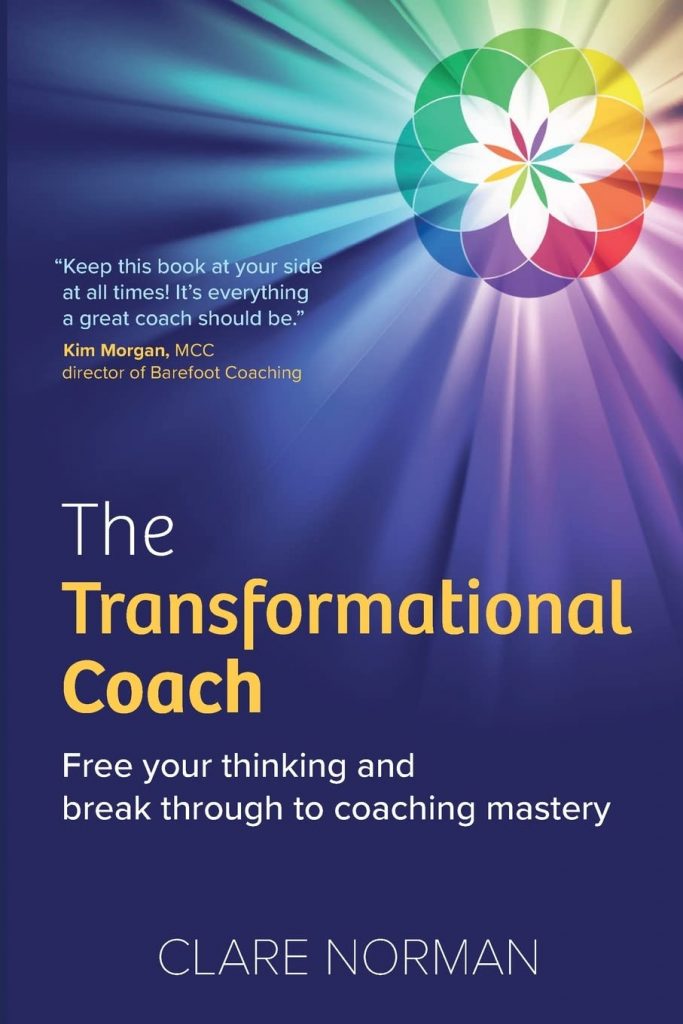Practical Learning and Reflections from a Transformational Coach
INTRODUCTION
Learning and reflections from The Transformational Coach: Free Your Thinking and Break Through to Coaching Mastery (Book by Clare Norman)

I am reading this book for the Tracy Sinclair Alumni Book Club. The book is in 7 sections, and these notes cover the first half of the book. However, rather than a book review (for which there are plenty on the net) I’m going to look at my practical lessons and personal reflections.
Various links are included in the comments below
CONTRACTING
There are many references to this in the 83 suggestions throughout the book. I am always a little cautious of the recipe approach to coaching which simply seeks to define the problem, chat using a structure (see list below) and eureka the solution.
GROW Model
1. Goal.
2. Current Reality.
3. Options (or Obstacles).
4. Will (or Way Forward).
Other Models (there are many!) include PEEP
1. Preferred outcome,
2. Exceptions (when is this not a problem),
3. Existing resources,
4. Progress so far
However, I did like the point that defining the problem often is the whole point of coaching. It is less about the solution and more about the process, less about the problem and more about the person. It is not giving the answer but developing the skills.
I think this is important because not all clients arrive with a clear idea of mission, vision, values, or purpose, goals and tasks.
RESPONSIBILITY
Throughout the 207 pages there are many references to the role and responsibility of client (thinker) and coach (thinking-partner). The point is that that the coach is not a consultant with a solution or a secretary to document the outputs of meetings. The responsibly is shared, with the coach in-charge of the process and the thinker responsible for the content, outputs and outcome.
I found this quite refreshing since I have in the past sought to remember everything that has been said, felt, thought over a series of meetings and understand the issues, implications and behaviours. However, author Clare Norman makes clear this is not the coaches’ role, any more than a hose is responsible for the water that flows through it. The plumbing metaphor is mine.
THE THINKING IS MORE IMPORTANT THAN THE STORY
Clare Norman also makes the case for interrupting and challenging stories which the thinker shares, on the basis that the aim is not for the coach to understand or learn (from something the thinker already knows) but instead for the thinker to reflect, reappraise, reconsider, resolve. This means not asking for more information, but instead provoking more reflection. Interestingly this then suggests that each coaching session is stand-alone, it is up to the thinker how the previous relates to the present session, or what happens next. There is no need for continuity or consistency for the coach, only that there is value for the thinker.
This is a challenging concept since most coaching questions are ostensibly about finding out more, potentially informing the coach rather than transforming the thinker.
DON’T BE A MAGICIAN BE A SHERPA
The book also makes the point that you should be yourself. You are a thinking-partner, not a guru or guide. Don’t try and be an enigma or detached from the conversation or content. Be a part of the process: see things and ask, hear things and enquire, feel things and share. In a previous article I said that I see myself as a sherpa following my client rather than guiding them and supporting the journey rather than seeking any particular destination.
OBSERVE, DON’T JUDGE
Never say “that’s great” or “excellent” or indeed anything that implies judgment by you as a coach or indeed that the thinker is somehow a student, follower, sub-ordinate. Support is good, but praise may not be helpful to the thinker being independent and self-reliant.
Feedback might be I can see that by doing x you achieved y. This is affirming rather than flattery and emphasizes their ability rather than your approval.
Overall I have enjoyed this book which has been thought provoking. Indeed even the process of reflecting on the key elements has been valuable and I look forward to writing about the second-half of the book soon.
Tim Rogers
Ex-Athlete, now Change Practitioner, ICF Coach, IoD Mentor, Mediation Practitioner
Mob 447797762051 Tim@ThinkingFeelingBeing.com
Helping people and organisations achieve their goals: We #facilitate and #support the #thinking, #feeling and #action needed to #resolve and move forward.
#timhjrogers #coach #mentor #mediation #jersey
USEFUL LINKS
The Transformational Coach: Free Your Thinking and Break Through to Coaching Mastery (Book by Clare Norman)
https://blackwells.co.uk/bookshop/product/The-Transformational-Coach-by-Clare-Norman/9781912300822
Book Review
https://www.booktopia.com.au/the-transformational-coach-clare-norman/book/9781912300822.html
Tracy Sinclair Alumni Book Club
